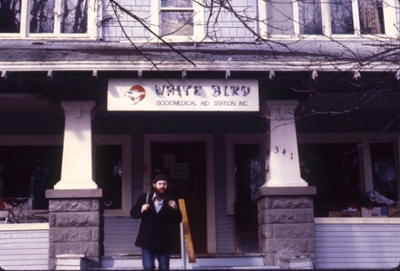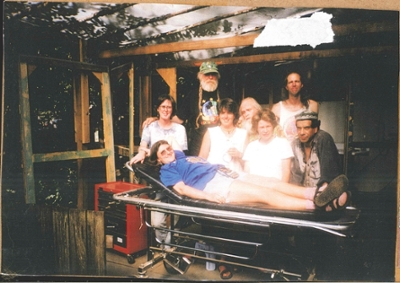McGill Lawrence: White Bird Legacies

White Bird worker in one of the CAHOOTS mobile crisis unit vans. (Photo from White Bird Archives, 1975)
I’m writing this as I’m coming to the end of my internship at White Bird, a multi-department crisis clinic in Eugene, Oregon. Founded in the late ‘60s as a response to droves of tripping hippie kids who descended on the town following the Grateful Dead and Ken Kesey (more or less), the clinic’s evolved over the years along with the population they work with. (Which, for three hopefully sunny and revel-filled days in May locally known as “Renn Fayre”, is the Reed community. If you’ve ever had a bad trip/sunburn/mental health crisis and been brought to a white tent between the SU and Eliot, you’ll recognize White Bird’s rock medicine department.) From a collection of cohabitating volunteers who provided 24 hour crisis service to trippers and street kids into an ever growing “collective of collectives,” White Bird has grown to be something of a household name in Eugene and continues to strive actively to improve and expand its services while retaining its status as a collective.
Each of the departments -- which includes medical, dental, homeless case management, front rooms, drug and alcohol treatment, long term counseling, mobile crisis, and rock med -- holds autonomy over its decisions and decides how it will operate, although some decisions have to pass through a weekly community-wide meeting known as Community. Community is run through its own “hippie bureaucracy” of announcements, check-backs, process checks, timekeepers, and facilitators. I started to think of the conversations that went on here as the growing pains of a collective: from its roots as a group of liberals/radicals who lived together and shared largely similar politics and goals, White Bird’s expansion and the changing nature of direct service in the community has diversified the mix of people who work there.
 My role here was a combination of a number of things, partly following in the path of previous Reed interns and partly exploring new terrain. I trained on the crisis and front rooms teams, worked on the Oregon Country Fair rock med team, took the new volunteer training class, learned a lot about the history of White Bird by working in the archives, and helped out on smaller projects as they came up. The best way I’ve found to describe my experience at White Bird is through the four stages of competence, which, as a shorthand model of thinking about thinking, could be worse. We start out at unconscious incompetence, in which an individual doesn’t have a skill and also doesn’t know what it would mean to have that skill. There’s a certain type of know-how that they both lack but, more importantly, can’t recognize as a skill set. The skill is opaque to them: they can recognize, maybe, that people have this skill, but it appears as something that’s easily learned like you would memorize a fact, rather than an embodied skill.
My role here was a combination of a number of things, partly following in the path of previous Reed interns and partly exploring new terrain. I trained on the crisis and front rooms teams, worked on the Oregon Country Fair rock med team, took the new volunteer training class, learned a lot about the history of White Bird by working in the archives, and helped out on smaller projects as they came up. The best way I’ve found to describe my experience at White Bird is through the four stages of competence, which, as a shorthand model of thinking about thinking, could be worse. We start out at unconscious incompetence, in which an individual doesn’t have a skill and also doesn’t know what it would mean to have that skill. There’s a certain type of know-how that they both lack but, more importantly, can’t recognize as a skill set. The skill is opaque to them: they can recognize, maybe, that people have this skill, but it appears as something that’s easily learned like you would memorize a fact, rather than an embodied skill.
After this comes conscious incompetence, where the person has recognized the value of the skill and starts to sense the different ways this skill might work. After this is conscious competence -- I do this thing, but I have to think about it -- and then, finally, unconscious competence: having mastered this skill, it becomes part of my being such that I don’t even have to bring it to mind in order to exercise it. I think I’ve come to a stage of semi-conscious incompetence: I’m beginning to learn what it is that crisis work is, by beginning to learn what questions I can ask that allow me some traction into the depth of what it has to teach. This came to me from relationships and interactions I had with people of White Bird who were astonishingly friendly and generous with their time and wisdom. For me, this is an incredibly exciting place to be as I prep to graduate in the winter.

Tags: mcgill lawrence
